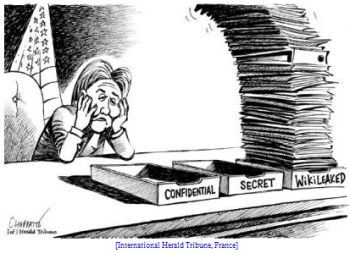
It’s one of the most fascinating details to emerge from the leak of classified U.S. diplomatic dispatches: Leaders in Saudi Arabia and a number of other Gulf nations want the United States to stop Iran and its nuclear program, or in the words of Saudi King Abdullah, ‘cut off the head of the snake.’
But as the articles below show, while the two nations may in fact be at loggerheads, they agree on one thing: both in Iran and Saudi Arabia, the suspicion is that this massive release is part of an intelligence operation. The Iranian regime calls it an American plot; whereas the Saudis suggest the hunt should be on for the intelligence service or services behind the leak.
In an article headlined Saudis Must Ask: Who Benefited from the WikiLeaks Disclosure?, for Saudi Arabia’s Al-Riyadh, columnist Dr. Hashim Abd Hashim writes in part:
The question that one must forcefully pose, regardless of the veracity of these documents – or lack of it- is: What party benefits from a leak of such a huge number of documents? And then we can also ask: Was an intelligence agency behind this leak, or is it purely a journalistic effort? … What is the nature of the interests that hide behind the establishment of this entity and the publication by such an entity or intelligence agencies of these documents in the manner we have seen?!
This is potentially very damaging and will lead to a severe disruption for many countries. This type if information must be read with extreme caution, because its publication is intended to achieve the greatest degree of disruption of international relations, shattering the trust among nations and peoples toward one another. Won’t it help such parties achieve what they want, if we offer up our countries and peoples to such tremendous psychological shock and begin to deal with one another – even within our agencies and public lives – in such a confusing and suspicious manner?!
But at the same time, this requires a particular brand of realistic thinking about our confidence in ourselves and our nation. Our agencies must not waiver. We have to expect the worst from this and yet we mustn’t let it affect us. This must not be permitted to disturb our way of thinking. But we have to realize that this is the reality of international relations and the nature of the politics of our age. We have to expect more such challenges. We must confirm that much of this information was tampered with, and that those who helped provide the information day to day [to the U.S. State Department], for a variety of reasons, may not have been acting constructively.
Earlier, from Iran’s government-run Kayhan newspaper, we posted a news item headlined WikiLeaks Release a ‘U.S. Plot to Sow Discord.’ The article extensively quotes Iranian Foreign Ministry Spokesman Ramin Mehmanparast:
“Regarding the WikiLeaks documents, the president has called this a highly dubious scheme … in order to authenticate the documents, certain crimes that were truly committed by Western countries and the U.S. have been included.”
Mr. Mehmanparast called the release a coordinated move and said that such a huge volume of documents couldn’t have been released without the cooperation of Western intelligence services, in particular that of the United States. He said the release is an effort to sow discord among countries in the region and fuel Iranophobia, and called on nearby states to exercise vigilance.
“The very fact that of all these documents, Mrs. Clinton focused on the ones that deal with the concerns of regional Arab states over the Islamic Republic of Iran’s nuclear program … makes us even more suspicious of the documents.”
READ MORE AT WORLDMEETS.US, your most trusted translator and aggregator of foreign news and views about our nation. Log on for continuous global reaction to the leak of U.S. diplomatic cables.
















